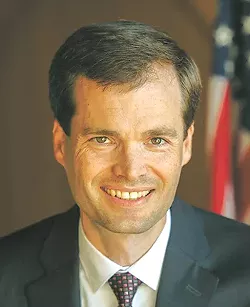
As a brand-new county commissioner four years ago, Shelly O'Quinn carried a book with her about how to make local and state government more efficient. With the book, called Extreme Government Makeover, in hand during a training session for newly elected officials, a man gave her a message.
"He said, 'You'll never change the culture of county government,'" O'Quinn recalls. "I was so upset with him that I walked up to the [Washington State Association of Counties] leadership at the end of that and said, 'I'm teaching this class in four years, because I'm going to prove you wrong.'"
O'Quinn is, in fact, teaching that class this December. She feels she has helped change the culture in Spokane County and fulfilled the promise she made four years ago of improving internal processes through what she calls "lean management," which she says has saved taxpayers millions of dollars. She says she'll continue those efforts, and her effort to reform the criminal justice system, as she seeks a second term on the Spokane County Board of Commissioners.

But her opponent, Andrew Biviano — a former mental health case manager and a current civil rights attorney — contends that he is the one with more experience when it comes to criminal justice reform. And he says since public safety makes up three-quarters of the county budget, criminal justice reform could save the county millions more.
"If criminal justice is 75 percent of the budget," Biviano says, "then somebody on the county commission should have some experience with criminal justice."
He says that sometimes it's necessary to spend money to save money. For example, he says a mental health case manager with 40 to 50 clients, like he used to be, can save millions of dollars in public resources by helping them live more independently — instead of incarcerating or hospitalizing them. He is advocating for more probation services, electronic monitoring and pretrial services that will keep people out of jail if they're not a threat to the community.
He criticizes how long it takes for reform efforts to happen with O'Quinn as chair of the Spokane Regional Law and Justice Council.
"The fact that it's not getting done is the evidence that change needs to happen," Biviano says.
O'Quinn, however, shares many of the same goals when it comes to criminal justice reform. She says she has actually tried to move faster than the rest of the other elected county officials on criminal justice issues, but says "collaboration takes time." A $1.75 million MacArthur Foundation grant to reduce overcrowding and racial disparities in the Spokane County Jail will help kick-start the work the county is already doing, she says.
"[Biviano] needs to spend more time with us, because he criticizes us on things we're already doing," O'Quinn says.
While criminal justice has been a focus of this race, wider differences in the two candidates' philosophies lie elsewhere. O'Quinn, for example, opposes the Spokane Transit Authority sales tax increase that would fund projects such as the Central City Line, a bus route from downtown to Spokane Community College. She says she isn't anti-transit, but she thinks STA can move forward with the plan without the sales tax increase. Biviano says he's "completely, diametrically opposed" to O'Quinn on this issue. He says he agrees with County Commissioner Al French that bus services are critical to economic growth and development.
Biviano says his land-use philosophy will be different than O'Quinn's. He says he wants more development, but says the county needs to make sure it isn't producing profits for developers that may hurt the public. Biviano has questioned O'Quinn's relationship with developers, accusing her and the county commission of giving them priority.
"The government needs to work the same for everybody," he says. "And you not only need to make sure there are no conflicts of interest, you need to make sure there are no appearances of conflicts of interest."
O'Quinn rolls her eyes when she hears that accusation, saying that "no one buys my vote." She says she represents everyone in the county, and that it's more than developers who are donating to her campaign.
"When I ran [unsuccessfully for the state House] in 2010, there were two things that I have said the entire time I'm in politics," she says. "No. 1: I will come out with my integrity. And No. 2: I never want anyone to say I never worked hard enough." ♦




















